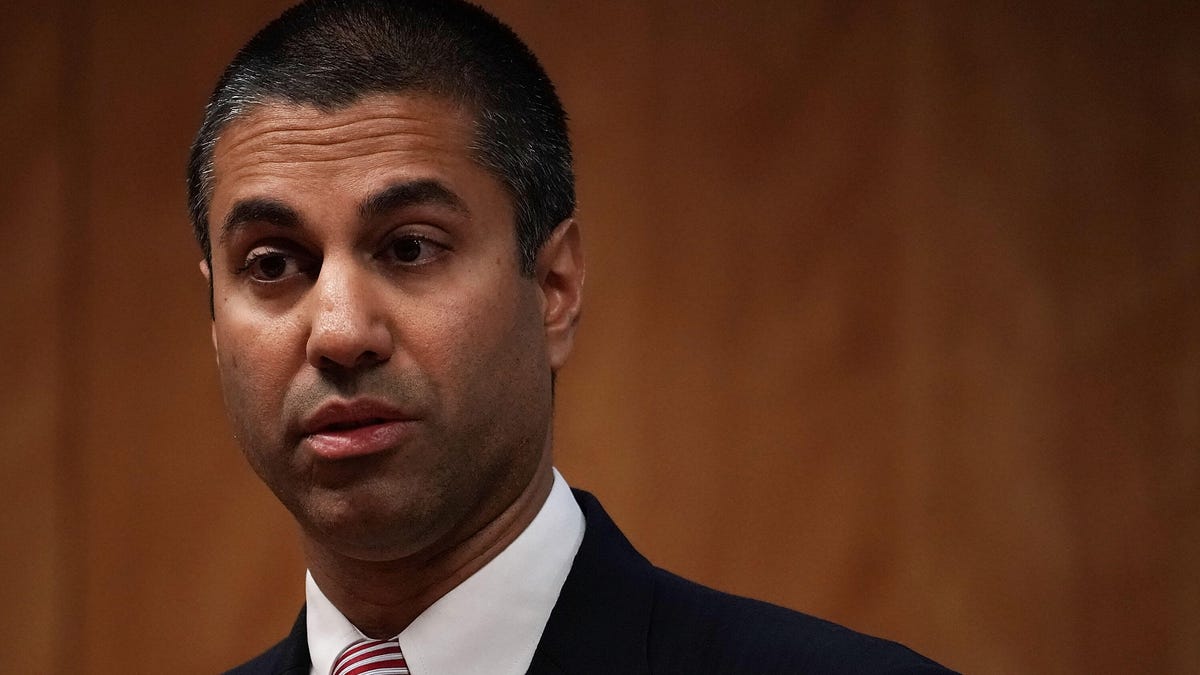5G brings up questions of cybersecurity vulnerabilities
Sen. Ron Wyden calls on the FCC to require cybersecurity standards for US wireless carriers rolling out 5G services.

FCC Chairman Ajit Pai discussed 5G security threats from Chinese tech companies.
Before 5G changes how people use technology, regulators and lawmakers want to make sure that the network update won't lead to a cybersecurity nightmare. For all the advances it'll bring in internet speeds and new devices, 5G could also be a gateway to more surveillance and cyberattacks.
But even though the issues are apparent, the way to attack them is open to debate.
On Wednesday, Sen. Ron Wyden, a Democrat from Oregon, called on Federal Communications Commission Chairman Ajit Pai to require cybersecurity standards for wireless carriers rolling out 5G services. Wyden is a leading senator on cybersecurity issues.
The letter came a day after Pai discussed cybersecurity and espionage concerns tied to 5G networks at the Council on Foreign Relations in New York.
"For all of the opportunities that 5G will unlock, it will also create new challenges," Pai said. "When 5G is embedded in almost every aspect of our society and economy, from businesses to homes, hospitals to transportation networks, manufacturing to the electrical grid, that means securing our networks will become much more important, and much more difficult."
The next-generation technology is expected to bring a wave of innovations, with enhanced internet speeds pushing advances in self-driving cars and virtual reality, along with letting you download movies and TV shows faster than ever. 5G networks are not widespread yet, and experts are hoping to address the security issues before they are.
Security researchers have found, for instance, that 5G networks are still vulnerable to International Mobile Subscriber Identity (IMSI) catchers, commonly known as "Stingrays." These surveillance devices impersonate cell towers and intercept network signals from devices, allowing attackers to gather information like location data and call details from people.
In July, the US' Cybersecurity and Infrastructure Security Agency also released a risk report on 5G adoption, warning about 4G vulnerabilities carrying over, along with the new technology bringing a flood of new connected devices open to attacks.
As the US starts to install 5G networks -- with T-Mobile looking to launch it in 30 cities, Verizon in 15 cities, AT&T in 21 cities and Sprint covering more than 1,000 square miles -- the security threats become more of a reality, experts warn.
Wyden's letter urges the FCC chairman to make sure wireless carriers are providing proper protections with 5G.
"The FCC has the authority to regulate wireless carriers and their use of the public airwaves, particularly in areas that involve public safety and national security," Wyden wrote. "The FCC must stop leaving the cybersecurity of American consumers, businesses and government agencies to wireless carriers, and finally secure America's next-generation 5G networks against interception and hacking by criminals and foreign spies."
The senator called on the FCC to require wireless carriers to encrypt data sent through 5G, including phone calls and text messages.
The FCC said it received Wyden's letter and is reviewing it.
In his speech on Tuesday, Pai didn't discuss any plans to ensure wireless carriers are protecting their customers or any efforts to address older vulnerabilities.
He addressed a different area of concern surrounding 5G networks -- its suppliers. The FCC chairman discussed issues with the Chinese government and Huawei, which is the world's top telecom supplier.
The Chinese tech company has been building out 5G networks, but the US government has been apprehensive about Huawei because it sees a national security threat.
The US is concerned about espionage and surveillance, given Huawei's ties to the Chinese government. Pai echoed several of those points on Tuesday.
He referenced China's recent acts of censorship against Blizzard and the NBA, alluding that the nation's government could do the same with control of 5G networks.
"If China is willing to use its leverage over basketball, gaming and emojis, imagine what could happen if we let Chinese companies equipment into tomorrow's 5G wireless networks," Pai said. "This would open the door to surveillance, espionage and other harms; stakes much higher than sports and entertainment."
You can read Sen. Wyden's full letter here:

